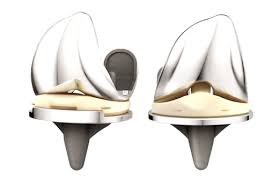
Report: DePuy’s Attune knee seeing “unusually high” rate of early failure (MassDevice)
Johnson & Johnson subsidiary DePuy Synthes’ Attune total knee arthroplasty system is experiencing an “unusually high” rate of early failure related to its tibial components, according to a new study
The study, recently published in the Journal of Knee Surgery, explored a number of FDA reports to its Manufacturer and User Facility Device Experience database related to the Attune knee. A search of the MAUDE system results in a total of 232 reports related to the Attune TKA.
In the study, researchers said they reviewed clinical, radiographic and intraoperative findings for patients who received the Attune system and later required revision surgery.
A total of 3 hospital databases were examined for such patients with tibial loosening at the implant-cement interface, producing a total of 15 cases.
“Patients presented with pain on weight bearing, effusion and decreased range of motion (ROM) within 2 years after surgery. Radiographic evaluation demonstrated loosening of the tibial components in 2 of 15 knees. This included cruciate retaining, posterior stabilized, fixed bearing and rotating platform bearing designs,” study authors wrote. “Intraoperative findings demonstrated gross loosening of the tibial component at the implant-cement interface.”
Researchers went on to indicate that there had been 21 reports of tibial loosening at the implant-cement interface to MAUDE in the past 2 months alone, with “numerous other tibial failures” also reported without the mechanism for failure specified.
“We believe that this complication is underreported due to failure of radiographs to assess loosening. In addition, MAUDE database reporting is not consistent and competing companies cannot provide data on the revised components. In patients who have negative workup for a painful joint, one must consider the diagnosis of debonding,” study authors wrote.
A response to the piece, also published in the Journal of Knee Surgery, suggested that the issue needed further investigation and a possibly registry study to determine the depth of the issue.
“When one looks at a case series, we really do not know the denominator, and this certainly could have been a series of cases out of more than 100,000 done, which would make this a rare event. Therefore, simply publishing cases are not evidence-based medicine, as we do not know how many of these were implanted. For example, ceramic fractures occur very infrequently, maybe 1 in 10,000; and yet, a small series could easily be published. The key is to know the denominator,” Dr. Michael Mont of the Cleveland Clinic wrote in his response.
The issue has drawn the attention of personal injury lawyer, with at least 1 lawsuit filed over the Attune device, alleging premature failure of the device and citing the published research in the Journal of Knee Surgery.